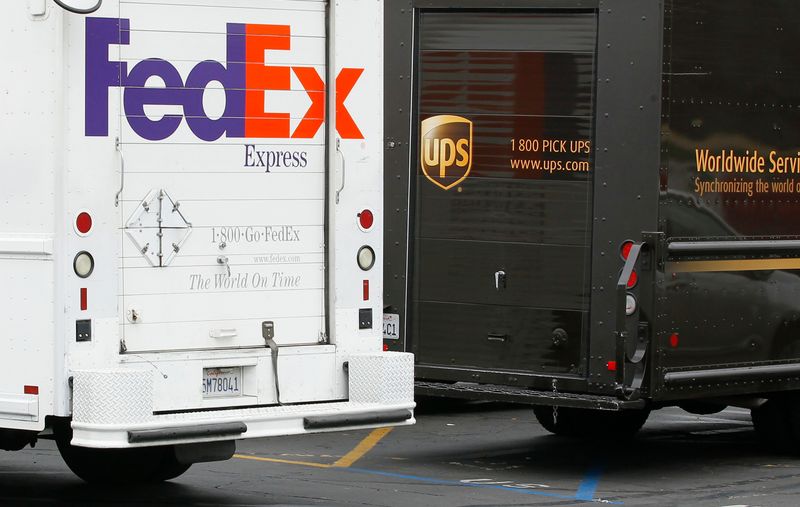By Lisa Baertlein
LOS ANGELES (Reuters) - United Parcel Service (NYSE:UPS) and FedEx (NYSE:FDX) on Friday shot down social media calls that they step in to deliver mail-in ballots from the U.S. Postal Service, which is warning states of potentially "significant" delays.
"State ballots must be postmarked to be considered valid and only the USPS has lawful postmarking status. Therefore UPS, FedEx and other private parties cannot technically be involved in shipping ballots," UPS told Reuters in a statement.
"FedEx does accept individual ballots, and we advise that customers planning to return their ballots via FedEx should closely review their state's guidelines on absentee voting and deadlines for ballots or related election documents," FedEx said.
Republican President Donald Trump on Thursday said he opposed providing funds for the struggling Postal Service for mail voting, which is expected to surge to 50% as the coronavirus pandemic rages ahead of the Nov. 3 presidential election.
The Postal Service said on Friday it has written to 46 states and the District of Columbia warning there is a significant risk voters will not have enough time to complete and return their ballots.
In a viral Twitter post https://twitter.com/djrothkopf/status/1294112165436313601?s=20 on Thursday, author and radio host David Rothkopf said there was a "big opportunity" for UPS and FedEx to deliver ballots for free. "You'll overnight become the most beloved and respected organization in America," he wrote.
Various laws and regulations for the most part prohibit private delivery companies from handling mail-in and absentee ballots, the companies and experts told Reuters. Exceptions include deliveries deemed "extremely urgent" by statute and deliveries on the day of and afternoon prior to election day.
In some states, collection would be prohibited because it would be considered "ballot harvesting," said Tammy Patrick, a former Arizona election official and senior advisor to the Democracy Fund foundation.
There are other hurdles that those companies, already coping with a pandemic-related surge in e-commerce shipments, would have to overcome.
For example, the Postal Service touches every U.S. mailbox six days a week. Private companies visit only when they have a delivery or an pre-arranged pickup - and they do not have blanket coverage in rural areas.
Amazon.com (NASDAQ:AMZN)'s upstart delivery service has also been floated as an alternative. That service does not do residential pickups.
Representatives from Amazon and the Postal Service did not immediately respond to requests for comment.
"Establishing a protocol of how they would collect the ballots would be a challenge," Patrick said.
Domestic costs would skyrocket since delivery firms charge significantly more for deliveries than the price of a 55-cent stamp, which is the cost to return many ballots.
And, international costs would be "astronomical," Patrick said.
